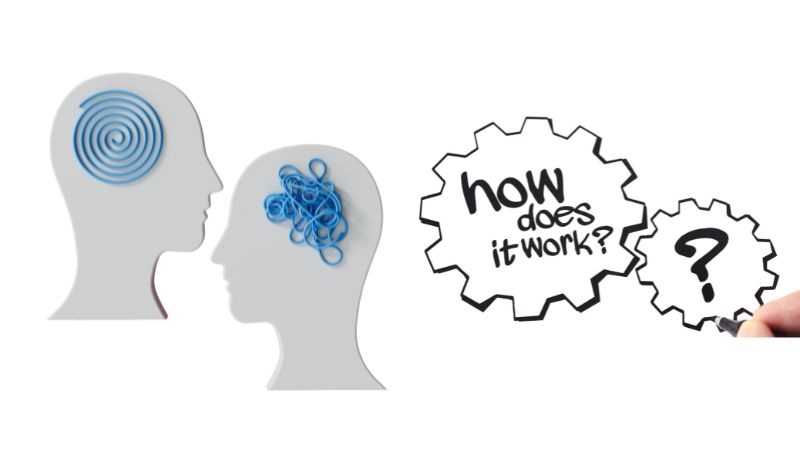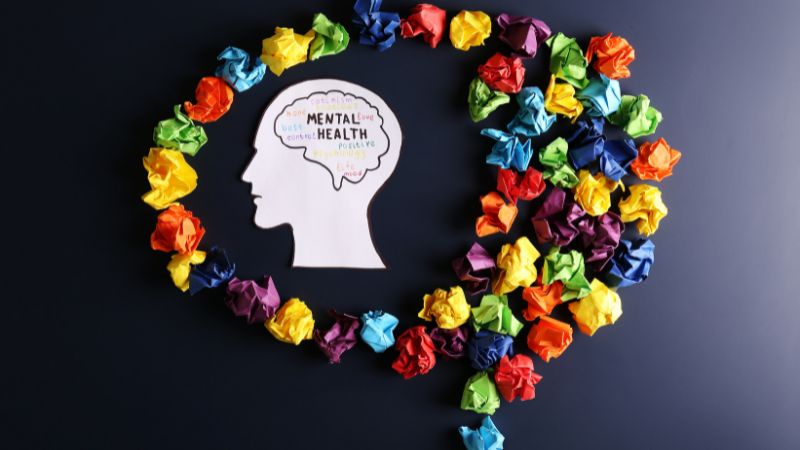Imagine a situation, where you are chilling on a peaceful beach with coconut water in hand. You have no commitments to fulfill, no deadlines to meet, and no unwanted comments for being yourself. Vacation can be a great idea to cope with stress and unwilling responsibilities but it is not a solution. As your vacation gets over, you will again live a life where someone else is driving your life. Living a competitive life is tough but a fact. When you cannot fulfill the expectations of others and yours as well, it might be challenging to function in your daily life. You may experience symptoms such as anxiety, depression, stress, and lack of concentration.
Professional help for mental health problems can be a great way to seek solution for mental stress if you’re struggling with mental health problems. A counsellor or therapist can provide you with the support and tools you need to improve your mental health and well-being.
What are Counseling and Therapy?

According to mental health experts of Mindcafe India, counseling and therapy are two terms that are often used interchangeably, but they have slightly different meanings. Counselling is a short-term process that refers to any professional support that is provided to help people deal with personal and emotional challenges. On the other hand, therapy is a long-term process that refers to the use of evidence-based treatments to address mental health conditions and give you solution for mental stress. In a nutshell, therapy is restricted to the treatment of mental health conditions whereas, counselling covers all the personal and emotional challenges that require expert opinion. Mental health therapy and counselling are the sure-shot way to get solution for mental health problems.
However, at the initial stages, we can even avoid therapy by acknowledging the root causes of our concerns. According to the experts, using some self-help techniques, in the initial stages, can be helpful in embracing-root level solutions for mental health problems. It is again advisable to seek professional support to know which techniques are best for you.
Some common types of counseling include:
- Individual counseling: This type of counseling is one-on-one between a client and a therapist. It can be used to address a wide range of issues, such as anxiety, depression, relationship problems, and grief.
- Group counseling: This type of counseling involves a group of clients meeting together with a counselor. It can be used to address a variety of issues, such as addiction, trauma, and career-oriented problems.
- Family counseling: This type of counseling involves multiple members of a family meeting together with a counselor. It can be used to improve communication and problem-solving skills and to resolve conflicts.
Some common types of therapy include:
Cognitive Behavioural Therapy
CBT is a type of therapy that focuses on root-level solutions for mental health by changing the way you think and behave in order to improve your mood and reduce symptoms of mental health conditions. CBT is based on the idea that your thoughts, feelings, and behaviors are all interconnected and that by changing one of these, you can change the others.
CBT is a short-term, goal-oriented therapy that typically lasts for 12-16 weeks. During therapy, you will work with your therapist to identify your negative thoughts and beliefs to challenge them and replace them with more realistic and helpful thoughts. You will also learn coping skills and strategies for managing your symptoms and improving your overall well-being.
CBT is an effective treatment for a variety of mental health conditions, including:
- Anxiety disorders
- Depression
- Eating disorders
- Obsessive-compulsive disorder (OCD)
- Post-traumatic stress disorder (PTSD)
- Substance abuse disorders
Psychodynamic Therapy
Psychodynamic therapy is a type of therapy that focuses on understanding and resolving unconscious conflicts that are thought to be the root of mental health problems. Psychodynamic therapists believe that our thoughts, feelings, and behaviors are influenced by our past experiences, even if we are not consciously aware of them.
Psychodynamic therapy is a long-term therapy that typically lasts for several years. During therapy, you will talk to your therapist about your thoughts, feelings, and dreams. Your therapist will help you to identify patterns and themes in your thoughts and behaviors and to explore how these patterns may be related to your current problems to embrace root level solution for mental health problems.
Psychodynamic therapy is an effective treatment for a variety of mental health conditions, including:
- Anxiety disorders
- Depression
- Eating disorders
- Personality disorders
- PTSD
- Relationship problems
How Counseling and Therapy are Solution for Mental Stress?

Mental stress is a common problem that can affect people of all ages. It can be caused by a variety of factors, such as work, relationships, finances, and health problems.
Counseling and therapy can help with mental stress by:
- Helping people identify and understand the sources of their stress.
- Developing coping mechanisms for managing stress.
- Changing negative thoughts and behaviours that are contributing to stress.
- Improving communication and relationships with others.
Root Level Solution for Mental Health
Counseling and therapy can help people address the root causes of their mental health problems. This can lead to long-term improvement and well-being. Reading self-help books and taking professional opinionby reaching out to them through appropriate mediums, or accessing their videos or courses available online for your specific problems may help you identify the root causes of your problem. Before reaching out to anyone, ensure that the person you are reaching out to is a professional and not a quack. These alternative ideas are pocket-friendly and equally effective at the same time.
For example, if someone is struggling with overthinking, accessing professional opinions through their recorded videos or online courses can help him identify the underlying causes for the same, such as negative thoughts and thinking patterns, stressful life events, etc. Once the root causes are identified, you can take the appropriate course of action or address your problems there.
How to Find a Counselor or Therapist
If you’re interested in finding a counselor or therapist, there are a few things you can do:
- Ask your doctor for a referral.
- Contact your insurance company to see if they have a list of in-network counselors and therapists.
- Search online for counselors and therapists in your area.
- Ask friends, family, or other trusted people for referrals.
When choosing a counselor or therapist, it’s important to find someone you feel comfortable with and who you trust. You should also make sure that the counselor or therapist is qualified and experienced in treating the type of mental health problem you’re struggling with.
Benefits of counseling and therapy

Counseling and therapy can offer a number of benefits, including:
- Improved mental health and well-being
- Reduced symptoms of anxiety, depression, stress, and other mental health problems
- Improved coping mechanisms for dealing with life challenges
- Increased self-awareness and self-esteem
- Better communication and relationships with others
- Improved quality of life
If you’re struggling with your mental health, counseling and therapy can be a great way to get help. A counselor or therapist can provide you with the support and tools you need to improve your mental health and well-being.
Need for Mental Health Awareness

It is important to understand that if you are struggling with your mental health, please know that you are not alone and that there is help available. Talk to your loved ones, share your problems with Mindcafe India or seek professional help for mental health and well-being. The only thing you have to do is embrace acceptance and be open about your problems. You will definitely get the right type of solution for mental stress.
Here are some tips to be open about mental health:
- Talk openly and honestly about mental health. Challenge negative stereotypes and stigma associated with mental health conditions.
- Educate yourself about mental health. The more you know about mental health, the better equipped you will be to advocate for yourself and others.
- Support people who are struggling with mental health problems. Let them know that they are not alone and that there is help available.
- Advocate for policies and programs that support mental health. Contact your elected officials and let them know that you support mental health funding and initiatives.
Mindcafe India is there to support you in your journey to improved mental health and well-being. We are committed to providing a safe space to our audience by providing a safe space on our website. You can even get quick solutions from the experts by sharing your problems on Mind Feeds. While counseling and therapy may not be available every time, Mindcafe India gives you all the solution for mental health problems at your fingertips.
Additional tips for better mental health:
- Get regular exercise. Exercise is a great way to reduce stress and improve your overall mood. Aim for at least 30 minutes of moderate-intensity exercise most days of the week.
- Eat a healthy diet. Eating a healthy diet can help you feel better physically and emotionally. Make sure to eat plenty of fruits, vegetables, and whole grains.
- Get enough sleep. When you’re well-rested, you’re better able to cope with stress and manage your emotions. Aim for 7-8 hours of sleep each night.
- Connect with others. Spending time with loved ones and social support networks can help improve your mental health. Make time for activities you enjoy and that connect you with others.
- Practice mindfulness. Mindfulness is the practice of paying attention to the present moment without judgment. There are many different ways to practice mindfulness, such as meditation, yoga, and spending time in nature.
Conclusion
Your journey to mental wellness is a unique one, and counseling and therapy can be valuable tools along the way. When you are struggling with mental health challenges, please know that you are not alone and that there is help available. Talking to a therapist can help you understand and manage your emotions, cope with stress, and develop healthy coping mechanisms.
Expressing your problem can help you find root-level solutions for mental health because it helps you address the underlying causes of your mental health challenges. By understanding and changing your thoughts, feelings, and behaviors, you can improve your mental health and overall well-being.
Get rid of negative thoughts and emotions by opting for Professional help for mental health. Counseling and therapy can be a great way to improve your mental health and well-being.



